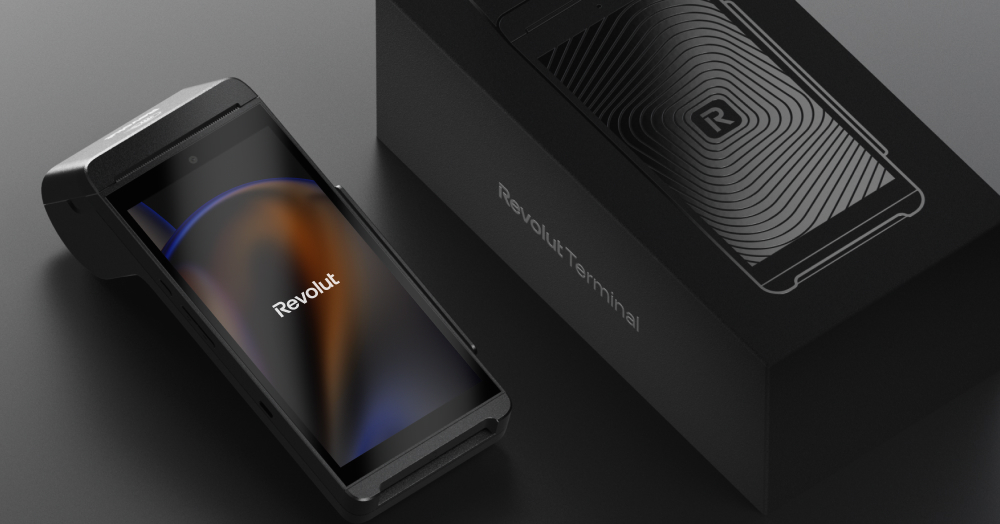Revolut is launching a new point-of-sale device as the UK challenger bank looks to expand its B2B offering.
Revolut Terminal is designed to provide quick payments that sync with Revolut Business accounts.
Revolut Business is an automated financial platform for businesses which helps firms accept and make payments globally.
The company is launching the device in the UK and Ireland ahead of Black Friday and the Christmas holidays, with with pre-orders beginning on Monday in the UK and in the next month for Ireland.
The global FinTech currently has more than 45 million customers worldwide and hundreds of thousands of business customers. Last month it reached a significant milestone after announcing it now has 10 million UK customers, solidifying its position as one of the country's largest financial technology companies.
The new POS device offers Revolut Pay, which allows customers to pay directly from their Revolut app during the process, with no extra cost to the merchant. When paying with Revolut Pay, customers can redeem earned points for discounts on their purchases.
Revolut Terminal also integrates with Revolut Business technology, which the company said aids cash flow with funds accessible within 24 hours.
The device can be paired with Revolut's POS software to give merchants access to advanced analytics, table mapping, multi-location management and customer catalogues.
Alex Codina, general manager of merchant acquiring at Revolut said that the launch comes as the business continues to invest into its B2B offering, with a particular focus on doubling down across the hospitality and retail industries as an acquirer.
“We’re continuing to see lots of momentum in Revolut Business, having this summer surpassed $500 million in annualised revenue and onboarding over 20,000 new customers per month," said James Gibson, general manager, Revolut Business. "Revolut Terminal marks the latest investment in our business customers, with merchants of all sizes now able to easily accept payments directly into their Revolut Business accounts, without juggling multiple providers.”
In July, Revolut received its long-awaited UK banking licence "with restrictions" after a three-year wait.
Approval from the Prudential Regulation Authority (PRA), the Bank of England’s arm that regulates and supervises financial services, means that the neobank can now enter a ‘mobilisation’ stage, also referred to as "authorisation with restrictions."
Revolut first filed for a UK banking licence in 2021. Since then, it has clinched approval from other countries, including Mexico.
A range of issues emerging over the past few years, including accounting and reputational issues and late accounts filings, made it more difficult for it secure a banking licence in the UK.
In August the FinTech announced a secondary share sale at a $45 billion valuation.
The company signed agreements with technology investors Coatue, D1 Capital Partners, and existing investor Tiger Global to provide liquidity to employees through the share sale.
The neobank said the move would allow employees to "capitalise on their contribution to Revolut’s growth", while attracting a diverse mix of both new and existing investors.
During the same month, Revolut announced it was facilitating instant cross-border card transfers for its UK and EEA-based business customers via Visa's real-time payments network.
Through Visa Direct, Revolut Business customers now only require a card number for transactions.
International transfers for businesses can often come with a set of requirements that differ depending on the country, including transfer fees or a lag time of several days due to the need for specific information such as IBAN and BIC. But through the new partnership, payments will arrive in recipient accounts within 30 minutes or less.
Latest News
-
Ofcom opens investigation into Meta over WhatsApp data disclosure
-
Amazon to cut 16,000 staff
-
British AI firm Synthesia raises $200m in funding round led by Google Ventures
-
Amazon Web Services extends Nationwide partnership to power digital banking transformation
-
TikTok finalises deal to split US operations from Chinese parent
-
Ubisoft scraps several titles and studios to reduce costs
The future-ready CFO: Driving strategic growth and innovation
This National Technology News webinar sponsored by Sage will explore how CFOs can leverage their unique blend of financial acumen, technological savvy, and strategic mindset to foster cross-functional collaboration and shape overall company direction. Attendees will gain insights into breaking down operational silos, aligning goals across departments like IT, operations, HR, and marketing, and utilising technology to enable real-time data sharing and visibility.
The corporate roadmap to payment excellence: Keeping pace with emerging trends to maximise growth opportunities
In today's rapidly evolving finance and accounting landscape, one of the biggest challenges organisations face is attracting and retaining top talent. As automation and AI revolutionise the profession, finance teams require new skillsets centred on analysis, collaboration, and strategic thinking to drive sustainable competitive advantage.
© 2019 Perspective Publishing Privacy & Cookies









Recent Stories